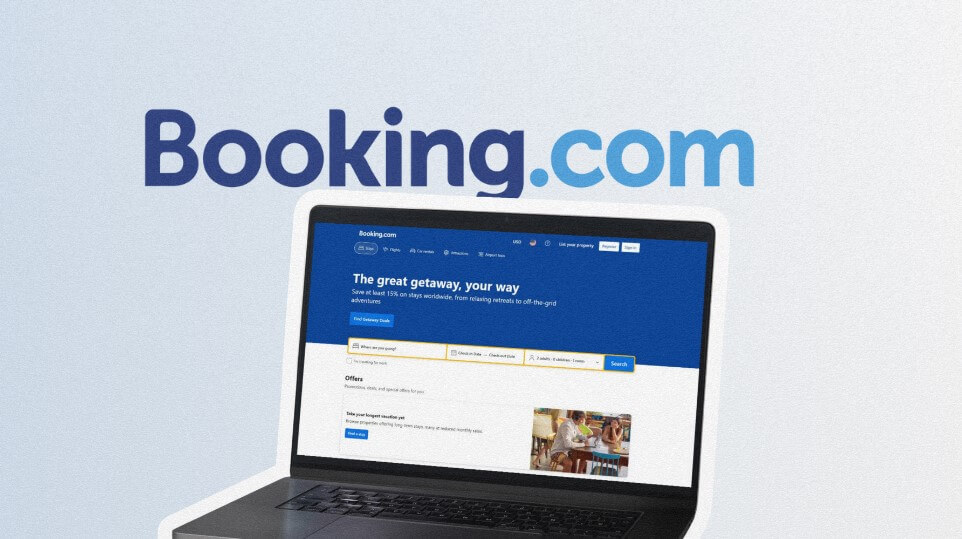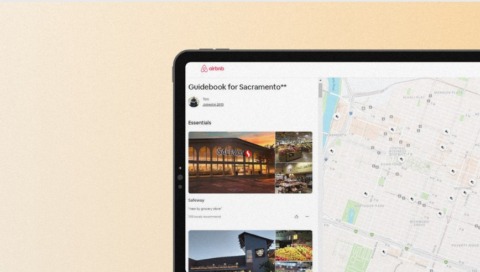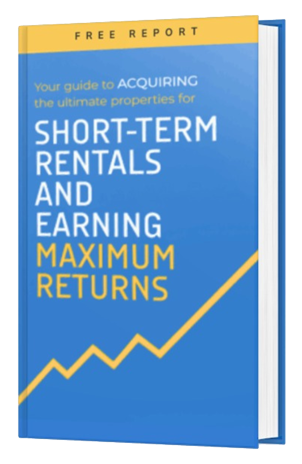Have you ever wondered, “how does Booking.com work?” Well, you’re in the right place! In this article, we’ll delve into how Booking.com works and discuss its pros and cons. By the end, you’ll have a better understanding of whether or not it’s the right choice for your STR business.
One of the things that goes into generating more income is having more occupancy. And the more OTA's we have our properties on, hopefully, the more occupancy we have. And Booking.com just happens to be the largest one in the world.
Tim Hubbard
What is Booking.com?
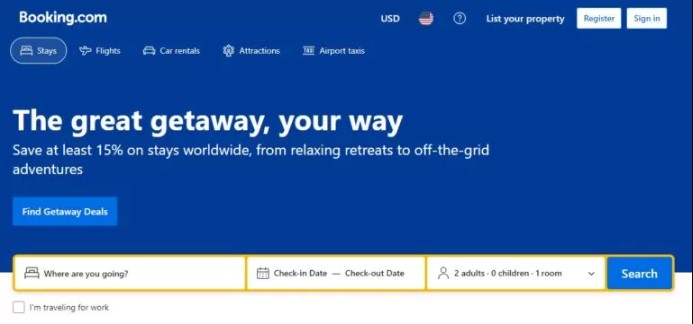
Booking.com is the largest online travel agency (OTA) in the world, boasting over 28 million listings. It is part of a conglomerate that includes other well-known brands like Kayak and Agoda.
As an OTA, Booking.com provides a platform for property owners to list their accommodations and connect with potential guests.
Getting Started with Booking.com
Getting started with Booking.com is relatively easy. You can visit their website and create a new listing, similar to the process on Airbnb. If you already have an Airbnb listing, you can even import many of your details directly into Booking.com.
During the listing creation process, you’ll need to provide information about your property, upload photos, and write descriptions. It’s important to make your listing as appealing and informative as possible to attract potential guests.
Here’s a step-by-step guide on getting started:
- Sign Up: Create a host account on the platform.
- List Your Property: Provide details, upload photos, and set your price.
- Set Availability: Update your calendar to reflect when your property is available.
- Manage Reservations: Monitor and manage your bookings with ease.
One thing that we do is we don’t allow booking.com reservations unless we have a two-day window at the time. This is so we have more time to chat with the guests, to feel them out, to look at past reviews, and make sure there’s nothing suspicious before we let them into our property or send them our check-in instructions. So, you might want to consider leaving a larger booking window. Meaning someone can’t book tomorrow and check in your property. Maybe you want to leave a few extra days before versus Airbnb where you feel comfortable and you can do it the same day.
Tim Hubbard
Booking.com Key Features
Here are some key features of Booking.com that make it an attractive option for STR owners:
Wide exposure
With millions of listings, Booking.com offers significant exposure for your property, increasing the likelihood of attracting more guests.
Integration with Property Management Software
Booking.com integrates with popular property management software platforms like Hostaway, allowing you to streamline your operations and manage your bookings more efficiently.
Calendar Sync
Booking.com offers a calendar sync feature, which allows you to synchronize your booking calendars across different platforms. This helps prevent double bookings and ensures that your availability is up to date.
Pros and Cons of Booking.com
Before diving into the workings of Booking.com, it’s important to consider its pros and cons:
PROS
- Potential to attract a large number of guests, including international travelers.
- While Booking.com does charge a commission (currently 15% at the time of writing), its rates are competitive compared to other OTAs.
- Payment feature where they collect payments on your behalf, reducing the risk of fraudulent bookings and ensuring you get paid.
CONS
- Does not collect a deposit on your behalf. This can be a potential risk for property owners, as the $300 damage authorization they provide may not cover significant damages.
- Allows you to set stricter booking policies, but this may deter some guests from making reservations.
How Does Booking.com Work?
Booking.com operates on a commission-based model. They charge a percentage (currently 15% at the time of writing) of the total reservation cost as their commission fee. This fee covers the platform’s services, including exposure, booking management, and customer support.
Commission and Payments
To manage your revenue effectively, you can adjust your prices specifically for Booking.com. Many property owners increase their rates on this platform to compensate for the commission fee. It’s worth noting that if you’re using property management software like Hostaway, you can automate these adjustments.
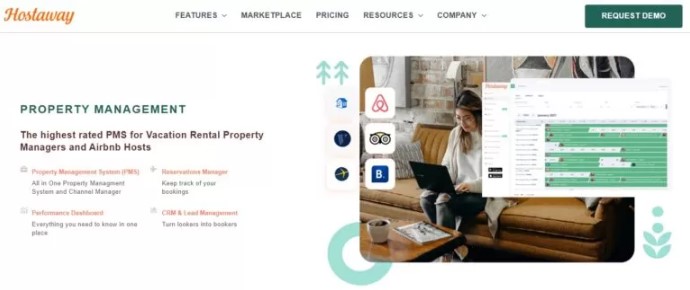
Previously, property owners had to handle payment collection themselves. However, Booking.com now offers a payment feature where they collect payments on your behalf. This helps simplify the booking process and ensures that you receive your payment without worrying about fraudulent reservations or declined cards.
The Evolution of Booking.com
Booking.com has evolved over the years to compete with other major players in the industry, most notably Airbnb. They continually introduce new features and enhancements to make it easier for property owners to list their accommodations and attract guests.
In recent years, Booking.com has expanded beyond hotels and ventured into the short-term rental market, offering a wider range of properties to guests. This diversification has allowed them to attract different types of travelers, including families, couples, and international guests.

Protecting Your Property
When listing your property on Booking.com, it’s essential to take steps to protect your property and mitigate potential risks. Here are some measures you can implement:
Strict Booking Policies
Set clear and strict booking policies that align with your comfort level. If a guest doesn’t agree with your policies, you have the right to decline the reservation.
Larger Booking Window
Consider leaving a few extra days between the booking date and check-in to give yourself time to communicate with guests, review their profiles, and evaluate any red flags.
Additional Deposit Collection
If you feel the need to collect a deposit outside of Booking.com’s payment feature, you can use payment processors like Stripe. This allows you to collect both payments and deposits directly.
You might be interested in this podcast episode on “5 Warning Signs you will have a Bad Guest“
Integrating Booking.com with Property Management Software
If you’re using a property management software platform, such as Hostaway, check if it integrates directly with Booking.com. While some integration is possible, certain details, such as amenities, may still require manual entry on Booking.com.
Integrating your property management software with Booking.com can help streamline your operations and ensure that your calendars stay synchronized across different platforms.
Tired of trading your time managing your listings?
Want to ensure every guest leaves a glowing review?
What if you could have a team available 24/7 without the hassle of building it yourself?
Let us handle it all and more!
Frequently Asked Questions
Booking.com is known for its vast range of listings, including hotels, B&Bs, and short-term rentals. Unlike some OTAs that focus on unique accommodations, Booking.com offers both traditional and unique options.
Booking.com can accept payments on your behalf, reducing the risk of fraudulent reservations. They ensure you get paid even if a guest doesn’t show up or cancels. They also offer international payment methods like PayPal, making it easier for international guests.
Booking.com has a sync feature that allows you to link and synchronize your calendars with other platforms using what they refer to as “iCal links.”
Ensure your policies align with your comfort level. For instance, you might want a longer booking window on Booking.com compared to Airbnb to vet guests more thoroughly.
Be aware that Booking.com doesn’t collect a deposit on your behalf. Consider using external payment processors like Stripe to collect deposits. Also, ensure your booking policies are strict and align with your comfort level.
Booking.com attracts a significant number of international guests. Their new payment feature supports international payment methods, making it easier for these guests to book.
Booking.com has more amenity options than all other OTA’s, so make sure all your property details are accurate and up-to-date. Regularly sync your calendars to avoid double bookings. Consider using property management software that integrates with Booking.com for smoother operations.
Booking.com doesn’t collect deposits. However, they have a $300 authorization where guests agree to pay up to this amount for damages.
Yes, if you’re using property management software, you can increase your prices specifically for the Booking.com channel to account for their commission. This is also referred to as channel markup.
Booking.com users often include guests with multiple previous bookings, families, couples, and a significant number of international travelers. Understanding this demographic can help tailor your offerings and marketing.

